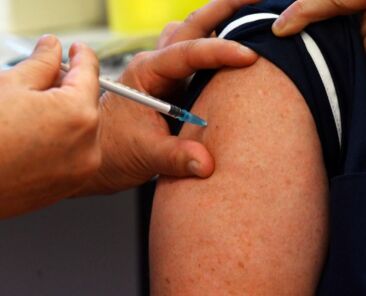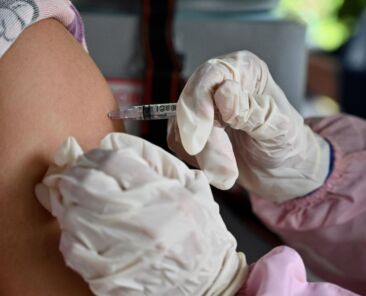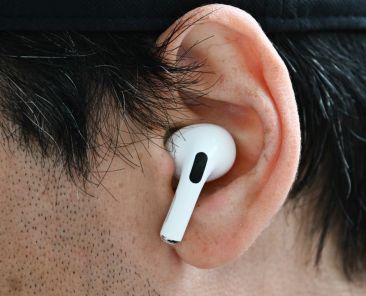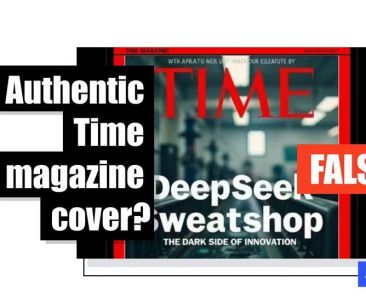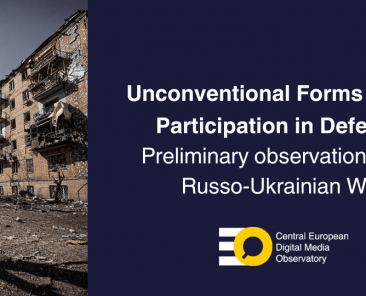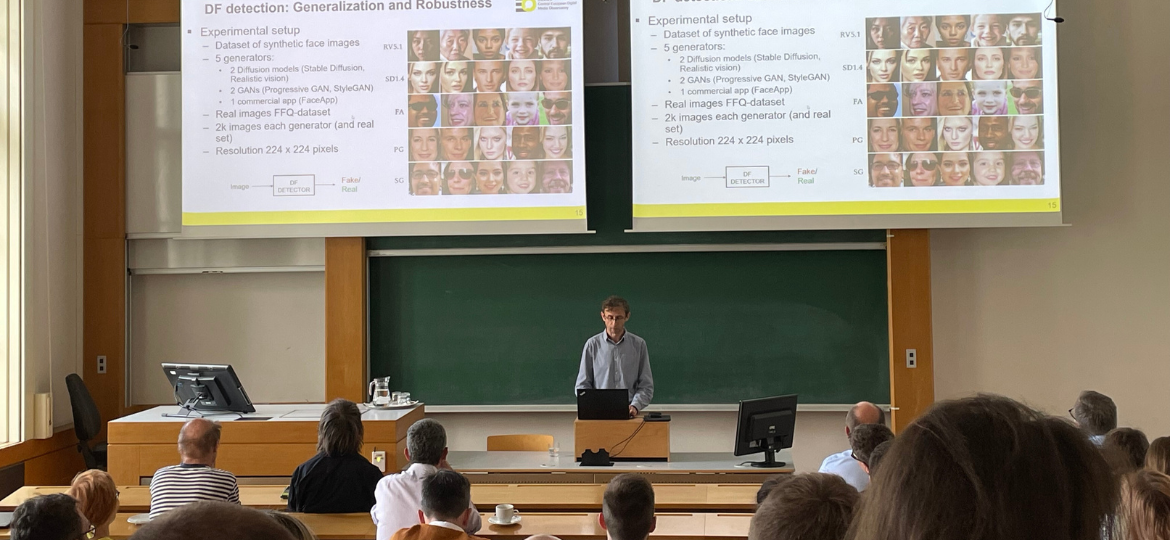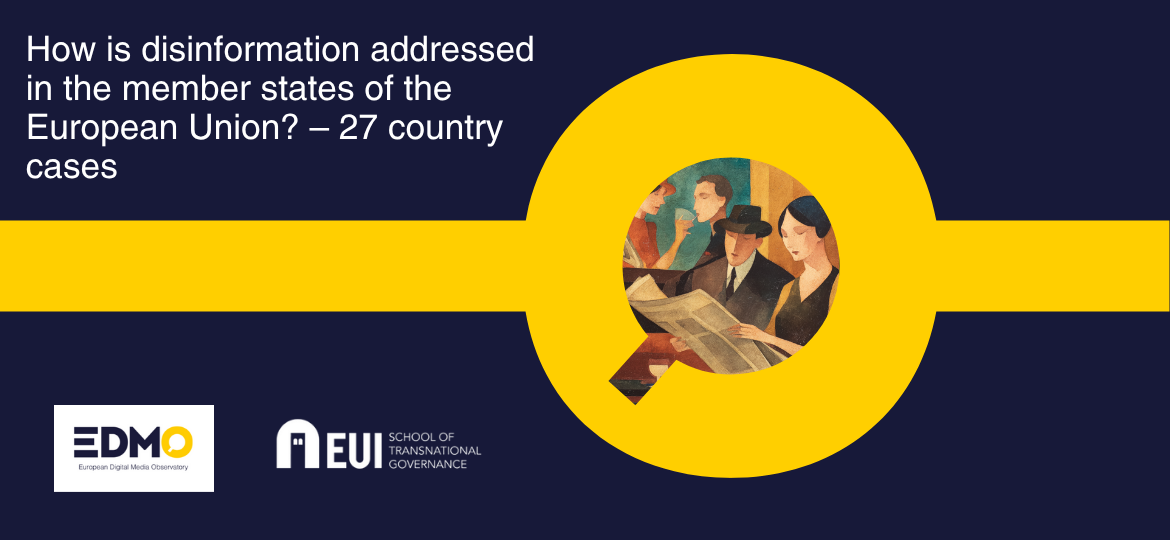About CEDMO
The Central European Digital Media Observatory (CEDMO), as an independent non-partisan multidisciplinary hub, aims to identify, research and prioritise the most critical sources and causes of information disorders in Central Europe (mainly the Czech Republic, Slovakia and Poland). This international consortium was created to propose a set of short and longer-term actions, as well as recommendations to help civil society, public institutions and the private sector respond to the declining trust in key institutions and help society to resist the effect of increasing exposure to mis- and disinformation.
By interacting and coordinating with European Digital Media Observatory (EDMO) and other regional EDMO hubs in EU, CEDMO will contribute to curbing threats posed by information disorders, including disenchantment with the democratic processes, and discord in civil society in Europe, and to building community and nation-wide resilience while protecting information ecosystems.
About CEDMO
The Central European Digital Media Observatory (CEDMO), as an independent non-partisan multidisciplinary hub, aims to identify, research and prioritise the most critical sources and causes of information disorders in Central Europe (mainly the Czech Republic, Slovakia and Poland). This international consortium was created to propose a set of short and longer-term actions, as well as recommendations to help civil society, public institutions and the private sector respond to the declining trust in key institutions and help society to resist the effect of increasing exposure to mis- and disinformation.
Our Partners
About CEDMO
The Central European Digital Media Observatory (CEDMO), as an independent non-partisan multidisciplinary hub, aims to identify, research and prioritise the most critical sources and causes of information disorders in Central Europe (mainly the Czech Republic, Slovakia and Poland). This international consortium was created to propose a set of short and longer-term actions, as well as recommendations to help civil society, public institutions and the private sector respond to the declining trust in key institutions and help society to resist the effect of increasing exposure to mis- and disinformation.
Our Partners
“According to WHO’s own data, more than 5,000,000 people are suspected to have been harmed by the COVID vaccines. The exact number today is 5,026,245 people, including tens of thousands of deaths,” said Tess Lawrie in an April 29, 2023 tweet.
“BREAKING: COVID-19 Vaccine Can Cause Blindness,” says the title of a May 5, 2023 tweet.
“Putin Orders Destruction of All Covid-19 Vaccines in Russia,” reads the headline of an article shared on Facebook.
“This is why solar doesn’t WORK IN CANADA,” says text written in what appears to be a layer of snow covering a solar panel in a photo posted February 27, 2024 on Facebook.
“Stop buying all aquatic and processed products from Europe,” read Chinese text overlaid on a TikTok video uploaded on December 12, 2023.
“We will never impose unnecessary and heavy-handed measures on you, the British people. We will still meet our international commitments and hit Net Zero by 2050,” Sunak said in a tweet (archive) on September 20, 2023, marking a major climate announcement.
“First sitting President in US history to be declared legally incompetent to stand trial,” says text over an image of Biden shared March 4, 2024 on X, formerly Twitter.
“Are you still wearing AirPods? These devices work by emitting and receiving radio frequency microwaves radiation, which can heat and damage your body’s tissues,” says the text accompanying a February 25, 2024 Instagram video with nearly 50,000 likes.
“Scientists found MASSIVE increased risks of developing several serious health conditions post-jab,” claims a February 23, 2024 Facebook post with a video of Del Bigtree, head of one of the best-funded anti-vaccine organizations in the United States.
“BREAKING: Ukraine ‘soldiers’ have resorted to faking combat in order to appear ‘war torn’ so the slush fund from the U.S. keeps churning money their way!” says a March 1, 2025 X post with thousands of interactions.
A common theme among spreaders of disinformation is that Ukrainian President Volodymyr Zelensky is a Nazi or that he embezzles Western aid intended for Ukraine. In the past, disinformation spreaders have falsely claimed that he bought a former mansion of Joseph Goebbels, two luxury yachts or even Adolf Hitler’s Mercedes.
“One of the reasons the polio vaccine doesn’t work is because polio isn’t caused by an infectious virus. It’s caused by toxins,” claims Children’s Health Defense in a March 1, 2024 post on X.
“We are in a CO2 famine,” reads the title of a chart shared on Facebook on February 20, 2024. It appears to show decreasing levels of atmospheric CO2 — measured in parts per million (ppm) — throughout the planet’s history.
“It is still a wonder what really happened to Facebook, Instagram and the entire Meta company. But based on my analysis, this is an effect of a solar flare,” says a March 7 YouTube video with more than 11,000 views.
The fabricated Time magazine cover was shared on X on February 10, 2025.
In his latest push to undo environmental goals established by the Biden-Harris Administration since returning to the White House, Trump signed an executive order (archived here) pushing for a return to plastic drinking straws, saying their impact on marine life was limited.
“RFK Jr. is correct about Lyme disease being created as a bioweapon in a lab on Plum Island, just off Connecticut’s coast,” says a January 29, 2025 X post from an account called “Shadow of Ezra,” which AFP previously fact-checked.
“Zelensky Is DITCHING Ukraine for America,” says the caption of a December 21, 2023 TikTok post from Clayton Morris, a podcaster and former Fox & Friends host.
“Media: One of #Zelensky’s bodyguards brought his chief’s visit to the #US to a vibrant conclusion starting a fight in a bar not far from the UN office because the visitors didn’t want to shout out after him ‘Glory to Ukraine,'” says a September 26, 2023 X post shared by the Russian embassy in South Africa.
“Yemen bombed the Israeli cargo ship ‘Unity Explorer’ American military ships and other Western bases came to Djibouti trying to rescue the Israeli cargo ship Unity Explorer, which has now sunk in the Red Sea,” says a December 3, 2023 post on X, formerly known as Twitter.
The image appearing to show a child trapped under concrete blocks was posted here on Facebook on October 19, 2023, and has since been shared more than 4,000 times.
“USA today They send support to Israel,” says text over the November 7, 2023 post from @myus.hamed5, a TikTok user who has previously misrepresented visuals amid the Israel-Hamas war.



















